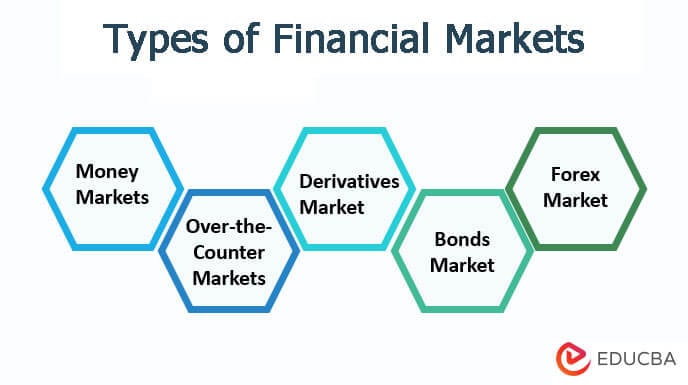Updated July 26, 2023
Definition of Financial Markets
Financial Market is a marketplace where financial asset creation and trading occur. Financial assets include shares, bonds, derivatives, commodities, currencies, etc.
The financial market of any country plays a crucial role in allocating the limited resources available in the economy of any country. Some financial markets are very small, with little activity, while some financial markets trade trillions of securities daily. It acts as an intermediary between savers and investors by mobilizing funds between them. So, the financial market gives buyers and sellers a platform to trade assets at a price determined by the market forces, i.e., demand and supply.
Types of Financial Markets
There are different types of financial markets, which are as follows:
1. Money Markets
A money market is basically for short-term financial assets that can be turned over rapidly at a minimum cost that instruments are quickly convertible into money with the least transaction costs. In the money market, participants engage in operations extending up to one year and trading short-term financial assets. This market is an institutional source of working capital for companies. These market participants are commercial banks, RBI, large Corporations, etc.; the instruments in the money market are commercial bills, commercial paper, certificates of deposit, treasury bills, etc.
2. Over the Counter Markets
This market is decentralized, not a centralized physical location. It is the secondary market. Here, the participants of the market trade with each other by using different modes of communication like electronic mode, telephone, etc. Companies that are traded in the OTC market are small. This market has less transparency, fewer regulations, and is inexpensive.
3. Derivatives Market
The derivatives market is the financial market that trades in securities that derive their value from some specified underlying asset. Derivatives do not have a physical existence but emerge from the contracts between two parties. These underlying assets may be debentures, shares, currencies, etc. The market price of an underlying item determines the derivative contracts’ value. This market trades in derivatives, including futures and forward contracts, swaps, options, etc.
4. Bonds Market
The bond is a debt security where an investor loans the money for a specific period and at an actual coupon rate, i.e., interest rate. These bonds include Corporate Bonds and municipal bonds from all over the world. The United States Treasury sells all kinds of securities, such as bills and notes, in the bond market.
5. Forex Market
The forex market is not a physical entity but a communication network among banks, brokers, and dealers. This is the market where all kinds of currencies are traded. It is the highest liquid market as cash is liquid. It includes market dealings like the spot market, forward market, etc.
Example of Financial Markets
For example, Company XYZ Ltd. wants to raise capital of $100,000 by issuing equity in the financial market. The company will issue the shares in the primary share market for the first time to the common public, offering new stock issues initially. Any subsequent tradings in the stock securities will happen in the secondary market.
Advantages and Disadvantages
Some of the advantages and disadvantages of the financial markets are as follows:
Advantages
- It gives a platform for buyers and sellers to meet to trade in the assets. The prices for trading are determined by the market forces, i.e., demand and supply. So It helps in the determination of the costs of securities.
- It helps mobilize the investors’ savings as the investor can put his money to the most productive use.
- For traders, the financial market platform provides the potential buyer and seller of their securities, which helps them save time and money in finding the potential buyer and seller.
- In the financial market, investors can sell their securities readily and convert them into cash, thereby providing liquidity to the tradable assets.
Disadvantages
- Prices in the financial market may not indicate a stock’s true intrinsic value because of some macroeconomic forces like taxes etc.
- Certain factors change the prices of securities suddenly. So there is a risk involved when trading in the financial market. If any negative news about the company comes, its price may greatly decrease, causing loss to the person holding its shares.
Important Points of Financial Markets
- The market, an arrangement, or an institution facilitates the exchange of financial instruments and securities.
- It may or not have a physical location. The assets can be exchanged between the parties via phone or the Internet.
- Some of the financial markets are very small, with little activity, while some of the financial markets trade trillions of securities daily.
Conclusion
To conclude, Traders actively buy and sell financial assets such as shares, bonds, derivatives, commodities, currencies, etc., making the financial market their marketplace. It is an arrangement or institution that facilitates the exchange of financial instruments and securities. It may or not have a physical location. The assets can be exchanged over the phone or the Internet between parties. Over the last few years, the role of the financial market has seen a drastic change because of several factors, such as low transaction cost, investor protection, high liquidity, pricing information transparency, legal procedures, easiness of settling disputes, etc.
Recommended Articles
This is a guide to Financial Markets. Here we discuss the types, examples, advantages, and disadvantages of the financial market, along with the important points. You can also go through our other suggested articles to learn more –




